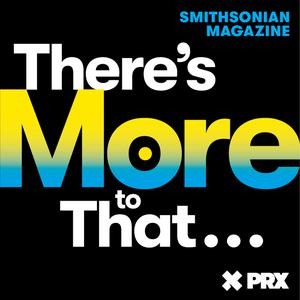
There's More to That
Smithsonian Magazine
Join Smithsonian magazine's journalists to explore the forces behind the latest in history, science and culture
- 7 minutes 12 secondsComing January 23: There’s More to That from Smithsonian magazine and PRX, Season 2
Smithsonian magazine covers history, science and culture in the way only we can — through rich reporting sparked by our editors’ insatiable curiosity. On There’s More to That, meet the magazine’s journalists and hear what they think about the biggest issues of our time. Find out how much more there is to… almost everything.
16 January 2025, 9:00 am - 36 minutes 26 secondsRE-BROADCAST: Meet the Wide-Awakes, The Club of Cape-Wearing Activists Who Helped Elect Lincoln and Spark the Civil War
We’re busy at work on our new season, which will hit your feeds later this month. In the meantime, we’re bringing you an episode of the Smithsonian Institution’s podcast Sidedoor to tide you over. Smithsonian curator of political history Jon Grinspan takes you inside the story of the Wide Awakes, a group of torch-bearing young activists who helped elect Abraham Lincoln and spurred the nation toward Civil War. Grinspan recently wrote about the Wide Awakes in an issue of Smithsonian magazine. We’ll be back soon with all new episodes to kick off our second season. Happy new year!
9 January 2025, 10:00 am - 38 minutes 2 seconds[Rebroadcast] Meet The 6888: The WWII Battalion of Black Women That Inspired the New Netflix Film
[First released in 2023.] The 6888th Central Postal Directory Battalion was the only unit comprised entirely of Black women to have been deployed overseas during World War II, and it had served a critical function: clearing the backlog of mail that marked the only line of communication between American soldiers in Europe and their loved ones back home.
In this episode, we speak with retired Army Colonel Edna Cummings, who made it her business to get the 6888 their belated recognition, and with Smithsonian magazine senior writer Jennie Rothenberg Gritz, who wrote about Col. Cummings' quest for the March 2023 issue of Smithsonian.
NOTE: On December 20, Netflix will debut "The Six Triple Eight," a movie that dramatizes the heroic story of the battalion. Starring Kerry Washington and featuring Oprah Winfrey, the film is directed by Tyler Perry.
Learn more about the women of the 6888th Central Postal Battalion at the Women of the 6888th site.
Find prior episodes of our show here.
There’s More to That is a production of Smithsonian magazine and PRX Productions.
From PRX, our team is Jessica Miller, Adriana Rosas Rivera, Genevieve Sponsler, Rye Dorsey, and Edwin Ochoa. The Executive Producer of PRX Productions is Jocelyn Gonzales.
Episode artwork by Emily Lankiewicz.
Music by APM Music.
19 December 2024, 9:00 am - 32 minutes 36 secondsAs Hurricanes Get Stronger, Can a $34 Billion Plan Save Texas?
After Hurricane Ike destroyed thousands of homes and inflicted an estimated $30 billion in damages in 2008, engineers hatched an ambitious plan to protect southeast Texas and its coastal refineries and shipping routes from violent storms. The $34 billion collaboration spearheaded by the U.S. Army Corps of Engineers is a harbinger of the type of massive public works projects that could be required to protect coastal cities like New York and Miami as sea levels rise and hurricanes become less predictable and more severe due to climate change.
Smithsonian magazine contributor and Texas native Xander Peters reflects on his experiences growing up in a hurricane corridor and tells us how the wildly ambitious effort came together. Then, Eric Sanderson, an ecological historian, tells us how the project could be applied to other low-lying coastal cities.
Read Xander Peters' Smithsonian magazine story about the Ike Dike here.
Let us know what you think of our show, and how we can make it better, by completing our There's More to That listener survey here.
Find prior episodes of our show here.
Listen to the New York Botanical Garden podcast "Plant People" here.
There’s More to That is a production of Smithsonian magazine and PRX Productions.
From the magazine, our team is Chris Klimek, Debra Rosenberg and Brian Wolly.
From PRX, our team is Jessica Miller, Adriana Rosas Rivera, Genevieve Sponsler, Rye Dorsey, and Edwin Ochoa. The Executive Producer of PRX Productions is Jocelyn Gonzales.
Fact-checking by Stephanie Abramson.
Episode artwork by Emily Lankiewicz
Music by APM Music.
8 August 2024, 11:00 am - 30 minutes 22 secondsHow to Sweat Like an Olympian
Have you ever felt embarrassed by the need to carry a towel, or even a fresh shirt, with you during the most sweltering months of the year? You shouldn’t. Sweating is one of the most remarkable ways our bodies protect themselves when the mercury heads north.
With summer temperatures spiking around the world as the sweat-filled Olympic Games begin in Paris, we’re joined by Sarah Everts, a Smithsonian contributor and the author a marvelous book called The Joy of Sweat: The Strange Science of Perspiration. She explains why the body’s thermostat is so ingenious, and how it cools athletes—and the rest of us. Plus: A series of snack-sized anecdotes about the Olympics!
Let us know what you think of our show, and how we can make it better, by completing our There's More to That listener survey here.
Find prior episodes of our show here.
Read Smithsonian magazine's coverage of the Olympics, past and present, here, here, here, and here.
There’s More to That is a production of Smithsonian magazine and PRX Productions.
From the magazine, our team is Chris Klimek, Debra Rosenberg and Brian Wolly.
From PRX, our team is Jessica Miller, Adriana Rosas Rivera, Genevieve Sponsler, Rye Dorsey, and Edwin Ochoa. The Executive Producer of PRX Productions is Jocelyn Gonzales.
Fact-checking by Stephanie Abramson.
Episode artwork by Emily Lankiewicz
Music by APM Music.
25 July 2024, 11:00 am - 34 secondsSurvey: Help Us Design Our Future Season
We're over here making podcasts, and you're over there listening. Let's bridge that gap! We want to know more about you, like: why you're listening, what your favorite topics are, and what Smithsonian magazine can do to make "There's More to That" even better. Tell us what you think at smithsonianmag.com/podcastsurvey.
15 July 2024, 7:00 pm - 29 minutes 31 secondsThe Wild Story of What Happened to Pablo Escobar’s Hungry, Hungry Hippos
Four decades ago, Pablo Escobar brought to his Medellín hideaway four hippopotamuses, the centerpieces of a menagerie that included llamas, cheetahs, lions, tigers, ostriches and other exotic fauna. After Colombian police shot Escobar dead in December 1993, veterinarians removed the animals—except the hippos, which were deemed too dangerous to approach. The hippos fled to the nearby Magdalena River and multiplied.
Today, the descendants of Escobar’s hippos are believed to number nearly 200. Their uncontrolled growth threatens the region’s fragile waterways. Smithsonian contributor Joshua Hammer joins us to recount this strange history and explain why Colombian conservationists have embarked upon an unusual program to sterilize these hippos in the wild via “invasive surgical castration,” a procedure that is, as he has written for Smithsonian magazine, “medically complicated, expensive and sometimes dangerous for hippos as well as for the people performing it.” Then, ecologist Rebecca Lewison tells us how her long-term study of hippo populations in Africa offers hints of how these creatures will continue to alter the Colombian ecosystem—and what authorities can do about it.
Let us know what you think of our show, and how we can make it better, by completing our There's More to That listener survey here.
Read Josh Hammer's Smithsonian story about Escobar's hippos and their descendants here.
Learn more about Rebecca Lewison and her work here.
Find prior episodes of our show here.
There’s More to That is a production of Smithsonian magazine and PRX Productions.
From the magazine, our team is Chris Klimek, Debra Rosenberg and Brian Wolly.
From PRX, our team is Jessica Miller, Adriana Rosas Rivera, Genevieve Sponsler, Rye Dorsey, and Edwin Ochoa. The Executive Producer of PRX Productions is Jocelyn Gonzales.
Fact-checking by Stephanie Abramson.
Episode artwork by Emily Lankiewicz
Music by APM Music.
11 July 2024, 11:00 am - 35 minutes 6 seconds‘The Crime of the Century,’ a Century Later
The past hundred years have seen more than one high-profile prosecution branded as the “crime of the century.” The shocking 1924 crime that was among the first to carry the title turned out to be a harbinger of how public mania around criminal cases could influence the legal system, and how psychiatry would be used and abused by prosecutors and defense attorneys alike as the 20th century wore on and gave way to the 21st.
Smithsonian editor Meilan Solly introduces us to teens Nathan Leopold and Richard Loeb and their botched, but still deadly, effort to perpetrate “the perfect crime.” What happened next was also surprising: After confessing to the abduction and murder of 14-year-old Bobby Franks, they were spared capital punishment thanks to their famed attorney Clarence Darrow. True-crime historian Kate Winkler Dawson then tells us how public interest in Leopold and Loeb’s fate helped solidify true crime as a durable subject of fascination. She also tells us about the tools used by the prosecution that were in their infancy during the famed case.
Read Meilan Solly's Smithsonian story about Leopold and Loeb here.
Learn more about Kate Winkler Dawson, her books, her podcasts, and her work at her site.
Find prior episodes of our show here.
There’s More to That is a production of Smithsonian magazine and PRX Productions.
From the magazine, our team is Chris Klimek, Debra Rosenberg and Brian Wolly.
From PRX, our team is Jessica Miller, Adriana Rosas Rivera, Genevieve Sponsler, Rye Dorsey, and Edwin Ochoa. The Executive Producer of PRX Productions is Jocelyn Gonzales.
Fact-checking by Stephanie Abramson.
Episode artwork by Emily Lankiewicz / photography by Katherine Kimball, Joshua Brasted, and Jeremy Tauriac
Music by APM Music.
27 June 2024, 11:00 am - 27 minutes 18 secondsAmerica’s Best New Restaurant Celebrates the Flavors of West Africa
African cuisine has always been well represented in the United States, particularly in dishes characterized as “Southern” in origin, like gumbo or hoppin’ john. But even before chef Serigne Mbaye’s New Orleans eatery Dakar NOLA was named the Best New Restaurant of 2024 at the James Beard Awards this week, the contributions of the African diaspora to the American diet had at last begun to enjoy a long-overdue reappraisal via reality television, Netflix docuseries and, most important, a number of widely praised dining establishments: If you want to book a table at Tatiana in Manhattan, Dept of Culture in Brooklyn or Kann in Portland, you’d better plan ahead, because their tables are often booked up well in advance.
In this episode, Smithsonian contributor Rosalind Cummings-Yeates explains how the ascendancy of pan-African cuisine from “auntie” restaurants into the rarefied fine dining sphere is part of a larger and more meaningful campaign of cultural reclamation. And Mbaye tells us why it was so important to him to make Dakar NOLA a showcase of the distinctive flavors of Senegal, where he spent his formative years.
Read Rosalind's Smithsonian story about the rise of West African fine dining in the U.S. here.
See the full list of 2024's James Beard Award winners here.
Find prior episodes of our show here.
There’s More to That is a production of Smithsonian magazine and PRX Productions.
From the magazine, our team is Chris Klimek, Debra Rosenberg and Brian Wolly.
From PRX, our team is Jessica Miller, Adriana Rosas Rivera, Genevieve Sponsler, Rye Dorsey, and Edwin Ochoa. The Executive Producer of PRX Productions is Jocelyn Gonzales.
Fact-checking by Stephanie Abramson.
Episode artwork by Emily Lankiewicz / photography by Katherine Kimball, Joshua Brasted, and Jeremy Tauriac
Music by APM Music.
13 June 2024, 11:00 am - 36 minutes 42 secondsHow Americans Got Hooked on Counting Calories More Than A Century Ago
In 1918, Lulu Hunt Peters—one of the first women in America to earn a medical doctorate—published the best seller Diet and Health With Key to the Calories, making a name for herself as an apostle for weight reduction in an era when malnutrition was a far greater public health threat than obesity. She pioneered the idea of measuring food intake via the calorie, which at the time was an obscure unit of measurement familiar only to chemists.
A century later, the Centers for Disease Control and Prevention reports that 42 percent of American adults are clinically obese and that Type 2 diabetes is on the rise. With those who can afford it now turning to pharmaceuticals to help them lose weight, we’ll examine why and how calorie counting has failed to help Americans maintain a “healthy” weight.
In this episode of “There’s More to That,” we hear from food historian Michelle Stacey about Peters’ legacy—and from Ronald Young Jr., creator and host of the critically acclaimed podcast “Weight For It,” about how American society continues to stigmatize what he calls “fat folks” for reasons that have nothing to do with public, or even individual, health.
A transcript is below. To subscribe to “There’s More to That,” and to listen to past episodes on the complex legacy of Sojourner Truth, how Joan Baez opened the door for Taylor Swift, how machine learning is helping archeologists to read scrolls buried by the eruption of Mount Vesuvius nearly 2,000 years ago and more, find us on Apple Podcasts, Spotify or wherever you get your podcasts.
Read Michelle Stacey's story about Dr. Lulu Hunt Peters in the June 2024 issue of Smithsonian here.
Listen to Ronald Young, Jr.'s podcast "Weight For It" here.
Find prior episodes of our show here.
There’s More to That is a production of Smithsonian magazine and PRX Productions.
From the magazine, our team is Chris Klimek, Debra Rosenberg and Brian Wolly.
From PRX, our team is Jessica Miller, Adriana Rosas Rivera, Genevieve Sponsler, Rye Dorsey, and Edwin Ochoa. The Executive Producer of PRX Productions is Jocelyn Gonzales.
Fact-checking by Stephanie Abramson.
Episode artwork by Emily Lankiewicz.
Music by APM Music.
30 May 2024, 11:00 am - 28 minutes 52 secondsENCORE: Those Orcas (Still) Aren't Doing What You Think
Last summer, news reports of orcas deliberately tearing the propellers off of yachts in the Strait of Gibraltar thrilled observers who were eager to cast these intelligent and social pack hunters as class warriors striking a blow for the “common mammals” against the one percent. That turned out to be wishful thinking, according to guest Lori Marino, a biopsychologist who studies whale and dolphin intelligence. She told us that these six-ton whales were just having fun—if they wanted to harm the occupants of those boats, we’d know it.
Even so, these encounters are becoming a predictable seasonal occurrence between the months of May and August: A 50-foot charter vessel sank after its hull and rudder were damaged in an orca encounter near the Strait of Gibraltar on May 12. So here again is our episode on the perils of assigning human motives to wild animals, featuring Marino and Smithsonian assistant digital science editor Carlyn Kranking. This episode was originally released in September 2023.
Dr. Marino invites you to learn more about The Whale Sanctuary Project at their site. You can also see Dr. Marino in the documentary films Blackfish (2013), Unlocking the Cage (2016), and Long Gone Wild (2019).
Find prior episodes of our show here. And read the transcript of this episode here.
There’s More to That is a production of Smithsonian magazine and PRX Productions.
From the magazine, our team is Chris Klimek, Debra Rosenberg and Brian Wolly.
From PRX, our team is Jessica Miller, Adriana Rosas Rivera, Genevieve Sponsler, Rye Dorsey, and Edwin Ochoa. The Executive Producer of PRX Productions is Jocelyn Gonzales.
Fact-checking by Stephanie Abramson.
Episode artwork by Emily Lankiewicz.
Music by APM Music.
20 May 2024, 8:45 pm - More Episodes? Get the App
Your feedback is valuable to us. Should you encounter any bugs, glitches, lack of functionality or other problems, please email us on [email protected] or join Moon.FM Telegram Group where you can talk directly to the dev team who are happy to answer any queries.
 Sidedoor
Sidedoor
 PORTRAITS
PORTRAITS
 Detours
Detours
 Radiolab
Radiolab
 This American Life
This American Life
 Fresh Air
Fresh Air